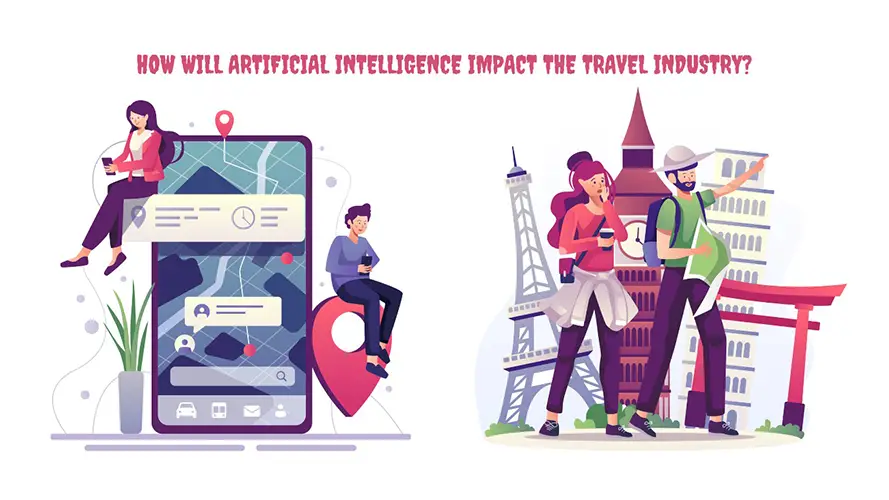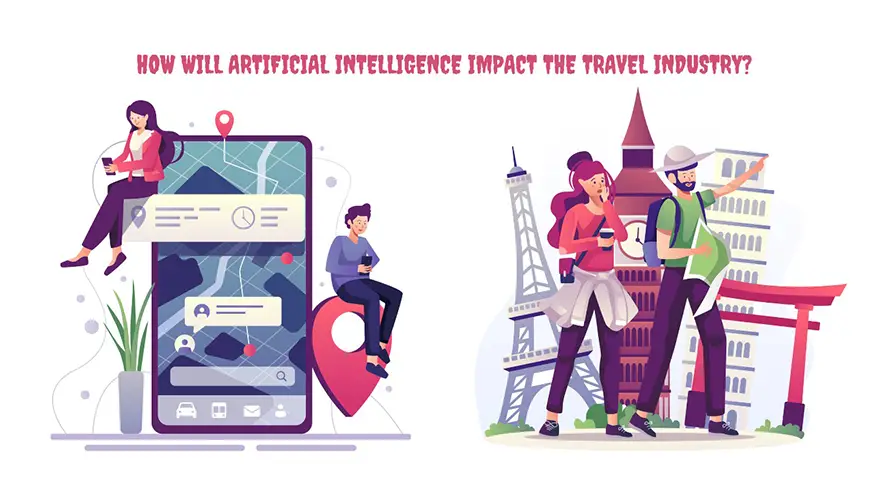
Technology has become our most reliable partner in almost every aspect of life. From ordering food to managing finances, technology is making life easier, and the travel industry is no exception. With the rapid rise of AI, The travel industry is undergoing a remarkable transformation. Today, AI is more than just a buzzword. This is an innovation that will revolutionize the way you plan, book and experience travel.

Artificial intelligence in tourism
Artificial intelligence is predicted to have a major impact on the travel industry and change the way we move around the planet. Increasingly sophisticated AI algorithms are enabling travel companies to deliver personalized experiences tailored to individual tastes. From finding the cheapest flight tickets to planning travel activities, the entire travel process is being taken over by AI.
Traditionally human-intensive tasks are now handled seamlessly by AI algorithms, saving businesses time and resources. AI's ability to learn from interactions has made customer service more responsive and increased satisfaction. Additionally, AI capabilities extend to data analysis, computation, and problem solving. This integration of artificial intelligence in the tourism sector not only streamlines processes, but also minimizes human errors, ensuring that tasks are carried out quickly and accurately around the clock.
What are the common uses of AI in the travel industry?
1. Personalized recommendations
Artificial intelligence (AI) is redefining the way travelers explore the world by providing personalized recommendations tailored to their unique preferences. AI algorithms not only suggest destinations, accommodations, and activities that match your personal preferences, but also analyze data such as past travel history, online behavior, and social media activity.
For example, if you've previously expressed an interest in adventure sports on social media, tourism industry AI might recommend destinations known for adrenaline-pumping activities. This level of personalization enhances the travel experience, making it more relevant and enjoyable for each traveler.
2. Efficient reservation process
AI streamlines the booking process by optimizing pricing strategies and ensuring seamless transactions. Advanced algorithms analyze market trends, demand patterns, and competitor pricing to provide competitive rates and maximize savings for travelers.
Airlines use dynamic pricing algorithms that adjust ticket prices based on demand, time-to-departure, and seat availability. Similarly, hotel booking platforms leverage AI to recommend accommodations that match travelers' preferences and offer the best value within their budget. This efficiency simplifies the booking experience and improves traveler satisfaction.
3. Strengthening safety measures
Safety is paramount in the travel industry, and AI is revolutionizing the way risks are assessed and minimized. AI-driven systems analyze vast amounts of real-time data to identify potential threats, strengthen security measures, and predict and prevent incidents and disruptions.
Airports are employing AI-powered facial recognition technology to enhance security screening, identify potential threats, and streamline boarding. Additionally, artificial intelligence in the tourism sector scrutinizes historical data and weather patterns to predict natural disasters and other emergencies to ensure traveler safety.
4. Improve customer service
AI-powered chatbots are transforming customer service in the travel industry. We provide instant support and resolve queries efficiently. The virtual assistant uses machine learning and natural language processing (NLP) to understand and respond to customer inquiries, providing her 24/7 support across multiple channels.
Travel booking platforms integrate chatbots into their websites and mobile apps, allowing travelers to receive instant assistance with booking flights, accommodation, or resolving reservation issues. The seamless integration of AI in the travel industry has reduced waiting times and improved the travel experience for customer service.
5. Predictive analytics
AI allows travel companies to predict demand through predictive analytics and adjust services accordingly. By analyzing large amounts of historical data and customer behavior, businesses can optimize resource allocation and stay ahead of competitors.
Airlines use predictive analytics to predict passenger demand on specific routes and adjust flight schedules and capacity to maximize revenue. Similarly, hotels can use this to optimize room rates and inventory management, ensuring competitive room prices while minimizing vacancies. This proactive approach to decision-making based on data-driven insights drives efficiency and profitability in the travel industry.
6. Targeted marketing campaigns
AI in the tourism industry allows travel companies to create targeted marketing campaigns based on customer preferences. By analyzing data from various sources such as browsing history, purchasing patterns, and social media activity, businesses can personalize ads, promotions, and offers to maximize engagement and conversion rates.
Travel agents can use AI-driven algorithms to segment customers based on travel interests, demographics, and spending habits and deliver relevant and timely marketing messages tailored to each segment. . This targeted approach not only improves your marketing efforts but also increases customer loyalty.
7. Real-time translation service
Thanks to AI-powered translation services, language barriers are no longer an issue when traveling. Advanced machine learning algorithms enable real-time spoken and written translation, allowing travelers to seamlessly communicate with locals, navigate foreign environments, and immerse themselves in new cultures.
A smartphone app with AI-powered translation instantly translates signs, menus, and dialogue into a traveler's preferred language, facilitating communication. This accessibility removes travel barriers and makes it easier for people from different linguistic backgrounds to explore the world and connect with others.
conclusion
Artificial intelligence is reshaping the future of the travel industry, ushering in a new era of efficiency and personalization. With the continued development of artificial intelligence, its impact on the tourism industry is increasing and we can expect even more innovative solutions to make travel more accessible, enjoyable and memorable.
But amidst the excitement of technological advances, let's remember the importance of human connection when traveling. While AI can increase convenience and streamline processes, the human touch enriches our travel experiences. Ultimately, it is important to balance AI, travel, and the human aspects to ensure a fulfilling and enriching travel experience.


